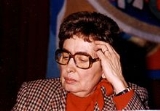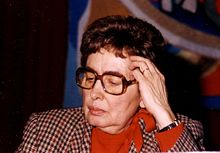
Monica Lovinescu
Encyclopedia

Romania
Romania is a country located at the crossroads of Central and Southeastern Europe, on the Lower Danube, within and outside the Carpathian arch, bordering on the Black Sea...
n essayist, short story writer, literary critic
Literary criticism
Literary criticism is the study, evaluation, and interpretation of literature. Modern literary criticism is often informed by literary theory, which is the philosophical discussion of its methods and goals...
, translator, and journalist, noted for her activities as an opponent of the Romanian Communist regime
Communist Romania
Communist Romania was the period in Romanian history when that country was a Soviet-aligned communist state in the Eastern Bloc, with the dominant role of Romanian Communist Party enshrined in its successive constitutions...
. She published several works under the pseudonyms Monique Saint-Come and Claude Pascal. She is the daughter of literary figure Eugen Lovinescu
Eugen Lovinescu
Eugen Lovinescu was a Romanian modernist literary historian, literary critic, academic, and novelist, who in 1919 established the Sburătorul literary club. He was the father of Monica Lovinescu, and the uncle of Horia Lovinescu, Vasile Lovinescu, and Anton Holban...
. She was married to the literary critic Virgil Ierunca
Virgil Ierunca
Virgil Ierunca was a Romanian literary critic, journalist and poet...
.
Lovinescu was born in Bucharest
Bucharest
Bucharest is the capital municipality, cultural, industrial, and financial centre of Romania. It is the largest city in Romania, located in the southeast of the country, at , and lies on the banks of the Dâmbovița River....
. A graduate of the University of Bucharest
University of Bucharest
The University of Bucharest , in Romania, is a university founded in 1864 by decree of Prince Alexander John Cuza to convert the former Saint Sava Academy into the current University of Bucharest.-Presentation:...
's Faculty of Letters, she made her literary debut in Vremea magazine, regularly publishing prose works in Revista Fundaţiilor Regale and theater chronicles in Democraţia. The rapid steps undertaken towards the establishing of an overtly communist rule in Romania forced her to take refuge in France
France
The French Republic , The French Republic , The French Republic , (commonly known as France , is a unitary semi-presidential republic in Western Europe with several overseas territories and islands located on other continents and in the Indian, Pacific, and Atlantic oceans. Metropolitan France...
: going there on a French government-sponsored scholarship
Scholarship
A scholarship is an award of financial aid for a student to further education. Scholarships are awarded on various criteria usually reflecting the values and purposes of the donor or founder of the award.-Types:...
in September 1947, she asked (in August 1948) for political asylum
Refugee
A refugee is a person who outside her country of origin or habitual residence because she has suffered persecution on account of race, religion, nationality, political opinion, or because she is a member of a persecuted 'social group'. Such a person may be referred to as an 'asylum seeker' until...
after Romania became a People's Republic
People's Republic
People's Republic is a title that has often been used by Marxist-Leninist governments to describe their state. The motivation for using this term lies in the claim that Marxist-Leninists govern in accordance with the interests of the vast majority of the people, and, as such, a Marxist-Leninist...
.
She published extensively on the subject of communism in her country, as well as works on Romanian literature. Her articles were frequently featured in prestigious magazines such as Kontinent
Kontinent
Kontinent was an émigré dissident journal which focused on the politics of the Soviet Union and its satellites. Founded in 1974 by writer Vladimir Maximov, its first editor-in-chief, it was published in German and Russian and later translated into English...
, Les Cahiers de l'Est, and L'Alternative. She contributed the
Romanian chapter of the collection of essays titled Histoire des spectacles (published by Éditions Gallimard
Éditions Gallimard
Éditions Gallimard is one of the leading French publishers of books. The Guardian has described it as having "the best backlist in the world". In 2003 it and its subsidiaries published 1418 titles....
).
Between 1951 and 1974, Monica Lovinescu was a contributor for Romanian language
Romanian language
Romanian Romanian Romanian (or Daco-Romanian; obsolete spellings Rumanian, Roumanian; self-designation: română, limba română ("the Romanian language") or românește (lit. "in Romanian") is a Romance language spoken by around 24 to 28 million people, primarily in Romania and Moldova...
broadcasts of the Radiodiffusion Française
Office de Radiodiffusion Télévision Française
The Office de Radiodiffusion-Télévision Française was the national agency charged, between 1964 and 1974, with providing public radio and television in France.-Post World War II:...
, as well as a member of the station's staff for Eastern Europe. From the 1960s onwards, she was a journalist for Radio Free Europe
Radio Free Europe
Radio Free Europe/Radio Liberty is a broadcaster funded by the U.S. Congress that provides news, information, and analysis to countries in Eastern Europe, Central Asia, and the Middle East "where the free flow of information is either banned by government authorities or not fully developed"...
, creating two weekly pieces that were influential in generating an internal opposition to the Nicolae Ceauşescu
Nicolae Ceausescu
Nicolae Ceaușescu was a Romanian Communist politician. He was General Secretary of the Romanian Communist Party from 1965 to 1989, and as such was the country's second and last Communist leader...
regime. Their main purpose was to inform Romanians of cultural and political trends on in the Free World
Free World
The Free World is a Cold War-era term often used to describe states not under the rule of the Soviet Union, its Eastern European allies, China, Vietnam, Cuba, and other communist nations. The term often referred to states such as the United States, Canada, and Western European states such as the...
. Part of the broadcast scripts were published as Unde Scurte ("Shortwaves"), in Madrid
Madrid
Madrid is the capital and largest city of Spain. The population of the city is roughly 3.3 million and the entire population of the Madrid metropolitan area is calculated to be 6.271 million. It is the third largest city in the European Union, after London and Berlin, and its metropolitan...
(1978).
She was the target of violent attacks in the Romanian communist press, the most notable of them being carried out by journalists Eugen Barbu
Eugen Barbu
Eugen Barbu was a Romanian modern novelist, short story writer, journalist, and correspondent member of the Romanian Academy. The latter position was vehemently criticized by those who contended that he plagiarized in his novel Incognito and for the anti-Semitic campaigns he initiated in the...
and Corneliu Vadim Tudor
Corneliu Vadim Tudor
Corneliu Vadim Tudor is leader of the Greater Romania Party , writer, journalist and a Member of the European Parliament...
. In 1977 she was knocked unonscious by members of the Romanian secret police securitate
Securitate
The Securitate was the secret police agency of Communist Romania. Previously, the Romanian secret police was called Siguranţa Statului. Founded on August 30, 1948, with help from the Soviet NKVD, the Securitate was abolished in December 1989, shortly after President Nicolae Ceaușescu was...
. Tudor maintains his views on her and other Radio Free Europe broadcasters, while frequently displaying nostalgia for the Ceauşescu epoch.
Lovinescu also translated several Romanian literary works into French
French language
French is a Romance language spoken as a first language in France, the Romandy region in Switzerland, Wallonia and Brussels in Belgium, Monaco, the regions of Quebec and Acadia in Canada, and by various communities elsewhere. Second-language speakers of French are distributed throughout many parts...
.
She died in Paris
Paris
Paris is the capital and largest city in France, situated on the river Seine, in northern France, at the heart of the Île-de-France region...
.

